Conservatives to 2016 GOP field: Defy us at your own peril
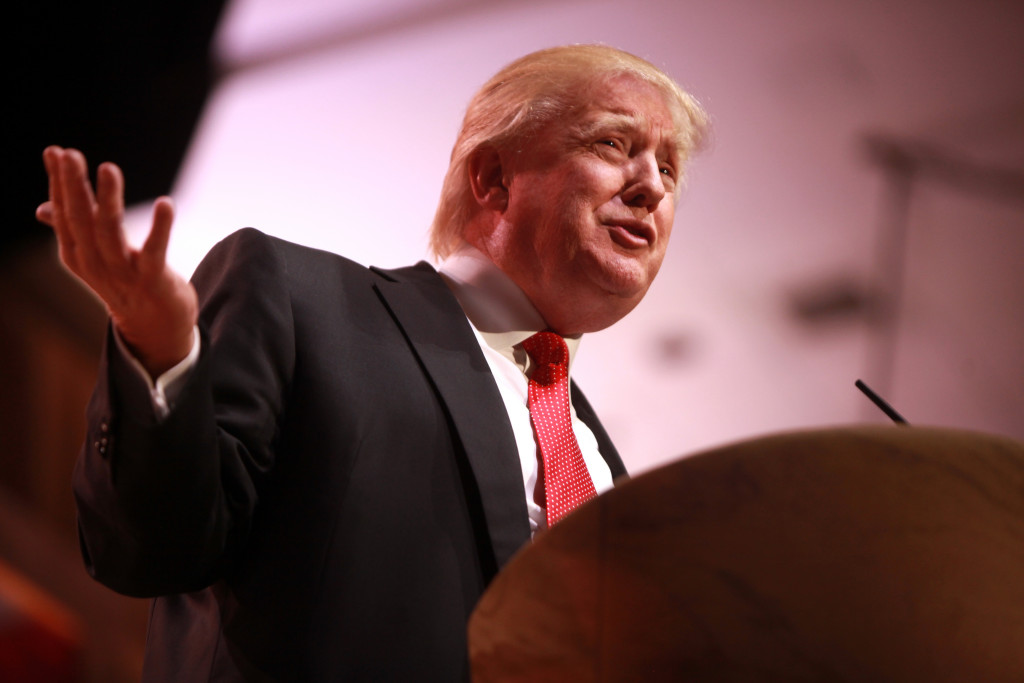
The Republican Party’s conservative wing, pumped up by House Speaker John Boehner‘s stepping down, is warning the 2016 presidential candidates that defying its wishes will come at their peril. Religious activists forcefully conveyed this message Saturday: embrace our uncompromising stance against abortion rights and gay marriage, among other priorities, even if doing so risks a federal government shutdown. An emboldened conservative movement signals fresh trouble for White House candidates viewed by the party’s frustrated base as insufficiently committed to their cause. Chief among them is former Florida Gov. Jeb Bush. “Conservatives are on fire at the moment,” said Gary Bauer, a former president of the Family Research Council. He was among the featured speakers at the Values Voter annual conference that brought an estimated 2,000 evangelical activists to Washington this weekend. Boehner’s announcement that he would resign from Congress by the end of October came without warning Friday, nearly four months before voting begins in the presidential primary. His decision revealed a deep divide within the GOP that raises questions about the party’s ability to unite behind one candidate next spring. Hard-line conservatives were deeply disappointed with the last two Republican presidential nominees – former Massachusetts Gov. Mitt Romney and Arizona Sen. John McCain. Boehner was unpopular among conservative activists, and his resignation will give them new hope that the party may choose a candidate who energizes the most passionate voters, even if that nominee is seen as less attractive to a general election crowd. A co-founder of the tea party movement said Boehner was just another of the establishment figures taken down by frustrated conservatives. “Today, the insurgency is more emboldened than ever and looks to even further dominate the presidential elections in 2016,” said Mark Meckler. “Our influence is growing.” In the crowded hallways of the Values Voter conference, 60-year-old Alvin Kaddatz said the turmoil on Capitol Hill sends a clear message to the presidential field. “They need to be listening to what the people are saying,” said Kaddatz, who sells farm equipment in Hillsboro, Texas. “They need to follow through on their promises. And if they don’t, elections have consequences.” It’s unclear whether grass-roots conservatives can back up their tough talk. But in an undeniably anti-establishment climate, the leading presidential contenders appear to be complying, for now. Most support a tea party-backed measure to strip federal dollars from the women’s health care provider Planned Parenthood as part of budget negotiations, even if such a move causes a partial government shutdown as early as this coming week. Polls show a majority of voters oppose such brinkmanship over this issue. Republicans were largely blamed the last time government shutdown over funding for the Affordable Care Act, which lasted 16 days in 2013. Who’s indicated a willingness to take it that far? Businessman Donald Trump; Sens. Marco Rubio of Florida and Ted Cruz of Texas; former technology executive Carly Fiorina; retired neurosurgeon Ben Carson; former Arkansas Gov. Mike Huckabee; Govs. Bobby Jindal of Louisiana and Chris Christie of New Jersey; and former Pennsylvania Sen. Rick Santorum. All those in the race want to strip the money from Planned Parenthood, but only a few want to do that without risking a shutdown. Put Bush and Ohio Gov. John Kasich in this category. That does little to help’s Bush’s standing with conservatives, already skeptical of his commitment to their principles. Bush was a noticeable omission from the Values Voter speaking program. He cited a scheduling conflict. Tony Perkins, president of the Family Research Council, which hosted the weekend conference, was surprised by Bush’s absence. “He needs to do well with this voting bloc,” Perkins said of social conservatives. “Especially where he’s at now in the polls. He needs all the help he can get.” Bush’s team cited 14 public and private meetings with religious conservative leaders since April, suggesting that his absence from the Values Voter summit did not signal a lack of commitment to their priorities. For Arlie Olsen, 64, who raises pigs in Blooming Prairie, Minnesota, Boehner’s departure was “a good omen for where the country may be headed.” Olsen offered a message to his party’s 2016 class: “It is going to be really hard for a candidate to win if they don’t have the backing of this group.” Republished with permission of the Associated Press.
When candidates confront inaccurate, inflammatory comments

Donald Trump was hardly the first to face this situation and won’t be the last. Candidates are confronted with all sorts of comments on the campaign trail, including plenty that are inaccurate and some that are sure to offend. How should they respond? On Thursday, GOP presidential candidate Trump faced such a moment when a supporter at a town hall event complained about Muslims in the country and stated that President Barack Obama is Muslim. Actually he is Christian. Here’s a look at how Trump and other candidates before him have handled such situations. — – Donald Trump: “We have a problem in this country. It’s called Muslims,” began the questioner – the first Trump had selected at a post-debate rally in the early voting state of New Hampshire. “We know our current president is one. You know he’s not even an American,” the man said. Trump, who once was a driver of the “birther” movement that falsely claimed Obama wasn’t born in the U.S, first laughed off the question, but let the man continue. “We have training camps growing where they want to kills us. That’s my question. When can we get rid of it?” the questioner said. Trump, who has shot to the front of the GOP pack with his own controversial statements, did not dispute the man. “You know, a lot of people are saying that, and a lot of people are saying that bad things are happening out there,” Trump responded. “We’re going to be looking at that and plenty of other things.” Trump’s campaign manager later said that Trump had had trouble hearing in the busy room, though the man had been amplified by a microphone and could be heard by reporters seated in the back of the auditorium. — – John McCain: In 2008, Republican presidential nominee McCain took questions from several angry voters that became a signature moment of the campaign. One of the questioners said he was fearful of a possible Obama presidency. Another claimed the future president was Arab. “First of all, I want to be president of the United States and obviously I do not want Senator Obama to be. But I have to tell you, I have to tell you, he is a decent person and a person that you do not have to be scared as president of the United States,” said McCain. The response earned him boos from the crowd. He was equally quick to correct a woman who said of Obama: “He’s an Arab.” “No ma’am,” replied McCain. “He’s a decent, family man citizen that I just happen to have disagreements with on fundamental issues. And that’s what this campaign is all about.” — – Mitt Romney: In 2012 GOP nominee Mitt Romney faced his own criticism on the campaign trail for failing to correct inaccurate statements, including those from none other than Donald Trump. Romney declined repeatedly to correct Trump, then a much-courted donor, for repeatedly questioning Obama’s birth certificate and place of birth. Ahead of one fundraising event in Las Vegas, Trump repeated his suspicions that Obama was born outside the country and therefore was unqualified for the office of the president. Pressed by reporters to disavow Trump’s comments, Romney took a pass. “I don’t agree with all the people who support me. And my guess is they don’t all agree with everything I believe in,” Romney said. “But I need to get 50.1 percent or more.” He also thanked Trump at the event “for twisting the arms that it takes to bring a fundraiser together,” adding: “I appreciate your help.” — – Bill Clinton: Candidate Clinton had perhaps the best-known reaction to an inflammatory statement – though not one made to him at a campaign event – when he inserted himself into a racial conversation by denouncing a rap star who’d said in a newspaper interview that, “if black people kill black people every day, why not have a week and kill white people?” Clinton, who in 1992 was courting African-American voters, addressed the comments in detail during an appearance in front of Jesse Jackson‘s Rainbow Coalition. Clinton quoted extensively from the remarks the rapper had made to The Washington Post and then proceeded to denounce them. “I defend her right to express herself through music. But her comments before and after Los Angeles were filled with a kind of hatred that you do not honor today and tonight,” he said. “If you took the words white and black and you reversed them, you might think David Duke was giving that speech,” he added, referring to the white supremacist. Republished with permission of the Associated Press.
Donald Trump declines to correct man who says Obama is Muslim
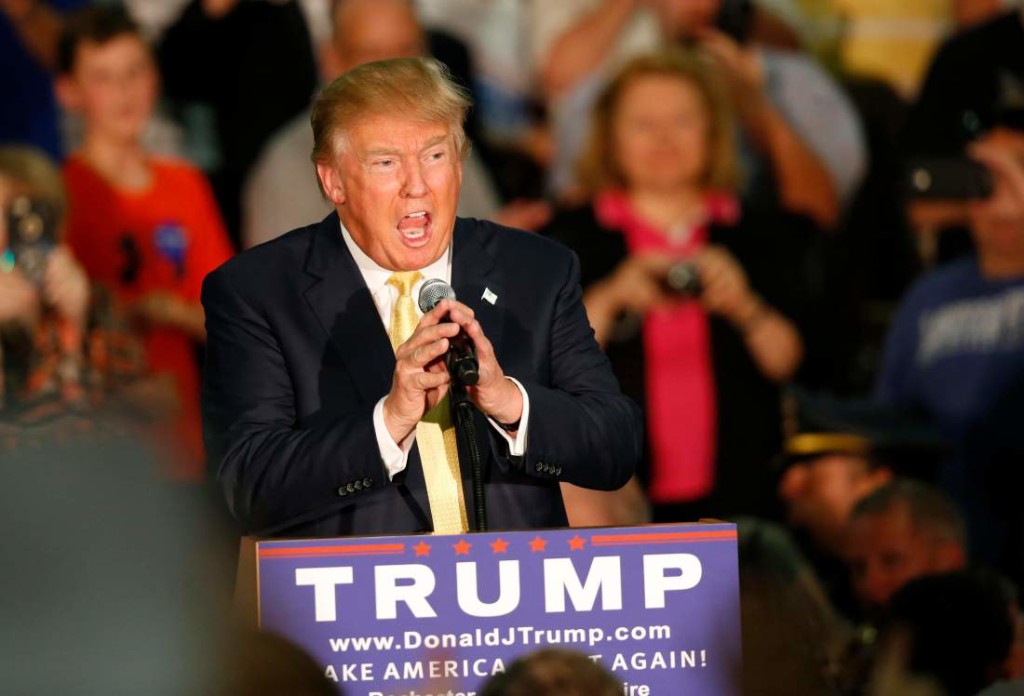
Republican presidential front-runner Donald Trump declined to correct a questioner at a town hall event who incorrectly stated that President Barack Obama is Muslim, and the billionaire real estate mogul said he’d be “looking at” a claim that militants operate training camps on American soil. Trump, who has a history of making controversial remarks about immigrants and other groups, was kicking off a town hall event Thursday evening in Rochester, New Hampshire — his first since Wednesday’s second Republican primary debate. “We have a problem in this country. It’s called Muslims,” said the first man Trump called on to ask a question. “We know our current president is one. You know he’s not even an American.” Trump, who was a driver of the “birther” movement that claimed Obama wasn’t born in the U.S, first responded with feigned exasperation — “We need the question,” he said, to laughs — but let the man continue. “We have training camps growing where they want to kill us. That’s my question,” the man in the audience continued. “When can we get rid of it?” Trump did not dispute the man’s assertions and said he’d heard others raise the issue. “We’re going to be looking at a lot of different things. And you know, a lot of people are saying that, and a lot of people are saying that bad things are happening out there,” said Trump. “We’re going to be looking at that and plenty of other things.” Democratic presidential candidate Hillary Rodham Clinton tweeted late Thursday that Trump should disavow comments about Obama and insults of Muslims. “Donald Trump not denouncing false statements about POTUS (president of the United States) & hateful rhetoric about Muslims is disturbing, & just plain wrong. Cut it out,” she tweeted. Trump rival Chris Christie, asked about the incident in a morning television interview, said that “if somebody at one of my town meetings said something like that, I would correct him.” But Christie, appearing Friday on NBC’s “Today” show, also said it is up to Trump to decide how to handle such situations, saying, “I’m not going to lecture him about what to do.” The incident evoked a moment during the 2008 campaign when Republican nominee John McCain took the microphone away from a woman who said she didn’t trust Obama because he was an “Arab.” Trump’s questions about the president’s country of birth helped build his stature among some conservative voters and pushed Obama to release a copy of his birth certificate in 2011. But Trump has distanced himself from the issue during his current run. Trump’s town hall, in a sweaty auditorium in Rochester, was also interrupted several times by a protester whose outbursts were met by hostility from the friendly crowd. Republished with permission of the Associated Press.
Donald Trump asks CNN to give debate advertising sales to veterans
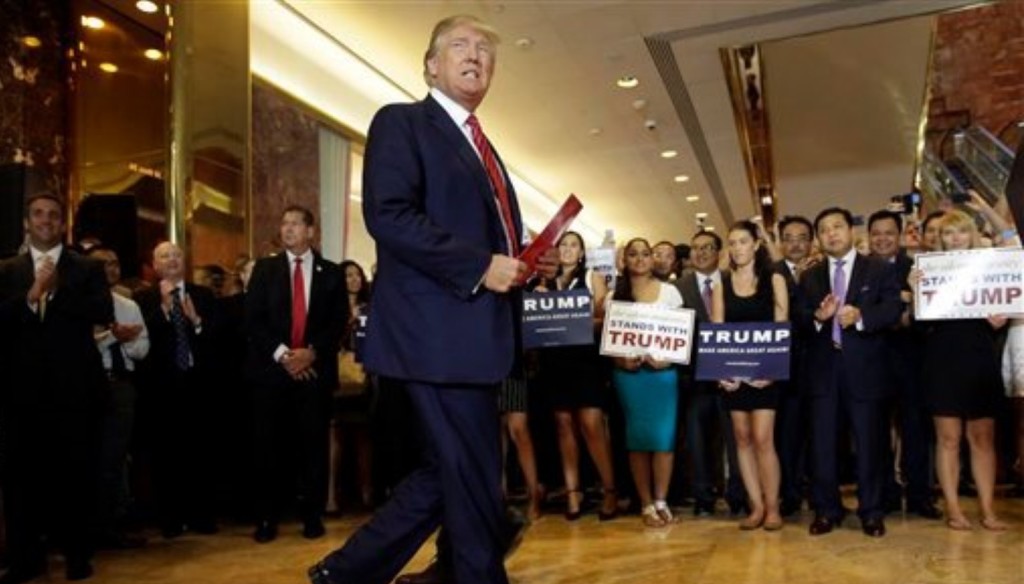
Republican presidential front-runner Donald Trump is asking CNN to donate to veterans the proceeds from advertising sold to air during next week’s Republican debate. In a Tuesday letter to the cable news network, the billionaire says he is the reason the network sharply increased its rates ahead of the Sept. 16 debate in Simi Valley, California. Trade publications have reported that CNN is asking for up to $200,000 for a 30-second ad, and that typical rates run as low as $5,000. Trump writes that the spike in viewer interest “is due 100 percent to Donald J. Trump.” Trump angered some veterans in July when he mocked Arizona Sen. John McCain, the GOP’s 2008 nominee and a former prisoner of war in Vietnam. Republished with permission of the Associated Press.
Donald Trump gets backlash for slamming TV host popular with GOP
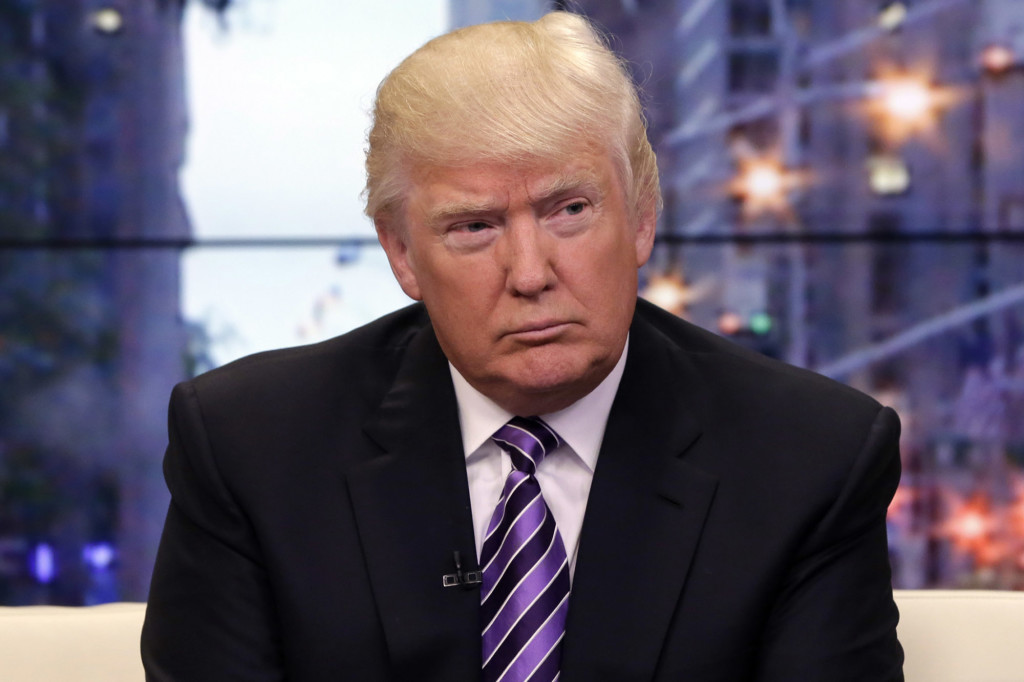
Donald Trump already slammed the president, the Democratic Party and his Republican rivals in the race for the White House, as well as immigrants from Mexico, the Chinese and Sen. John McCain for being a prisoner of war. To that fast-growing list he has now added Fox News Channel host Megyn Kelly. The Republican Party has long wrestled with the public perception that it is waging a “war on women” and has struggled to convince more women that it’s on their side. By Sunday, as Trump made the rounds of the morning talk shows, he was insisting, “I cherish women.” And yet for the outspoken, combative Trump, Kelly would seem to represent a type of person primed to get his goat. At 44, she is recognized as successful, whip-smart, commanding and, as she demonstrated during Thursday’s GOP debate, a woman more than ready to stand up to the 69-year-old billionaire. Trump’s position on women might be signaled by his proud ownership of beauty pageants and by his wisecrack on a TV show a decade ago that he would date his own daughter, a former teen model who was then 24, if only he weren’t her father. Referring to her debate dust-up with Trump, Kelly said in an interview broadcast Sunday, “I’m sure he’ll get over that. We’ll be fine. And so will America.” But her appearance on Fox News Channel’s “Media Buzz” was taped Friday, before Trump made his “blood coming out of her wherever” remark. Since arriving at Fox News in 2004, Kelly has broken out as a superstar. Her prime-time program, “The Kelly File,” which she launched two years ago in an upgrade from her afternoon slot, attracts upward of 2.5 million viewers. A native of Syracuse, New York, Kelly had been a self-described “unhappy Washington lawyer” when she began as a weekend reporter for a local Washington station in 2003. A year after that, she was hired by Fox News chief Roger Ailes. There she struck a different chord from the partisan hosts who surrounded her on the schedule, carving out an image as a calls-’em-as-she-sees-’em yet not-so-doctrinaire figure. “I’ve never wanted to be an opinion host, and Roger Ailes hasn’t wanted me to be an opinion host,” she told The Associated Press in 2013. “I don’t think I’d be very successful anyway. I’m not an ideologue. … I think I’m too moderate and reasonable.” Kelly has cultivated an image of speaking up in ways that have even run counter to Fox’s image. On election night 2012 she left the set to go interview Fox’s behind-the-scenes numbers analyst, tamping down the embarrassment of on-air contributor Karl Rove questioning the pronouncement that President Barack Obama had won re-election. Her legal training helped Fox correct, quicker than its rivals, an initially wrong report on the Supreme Court’s health care decision in 2012. She expressed disgust at a man’s suggestion that children of working mothers don’t fare as well as children with stay-at-home moms. In June, she scored a plum assignment from her bosses: She was tapped to interview two of the Duggar daughters who admitted to being sexually fondled by their brother, Josh Duggar, all stars of the TLC reality series, “19 Kids and Counting.” Kelly also interviewed the parents, Jim Bob and Michelle Duggar, for what was the family’s first discussion of the molestation episodes a dozen years before. Kelly’s latest showcase was joining fellow Fox News colleagues Bret Baier and Chris Wallace to moderate Thursday’s debate with Trump, the current GOP presidential front-runner, and nine other contenders. Kelly and Trump clashed early on. A tense exchange found her pressing Trump on his history of calling “women you don’t like `fat pigs, dogs, slobs, and disgusting animals,’” with Trump firing back, “What I say is what I say. And honestly, Megyn, if you don’t like it, I’m sorry. I’ve been very nice to you although I could probably maybe not be, based on the way you have treated me. But I wouldn’t do that.” By Friday, Trump had seemingly decided to be less nice. “She’s not very tough and not very sharp,” he said during a phone interview on CNN, then, referring to Kelly’s style of questioning him, he added, “There was blood coming out of her eyes, blood coming out of her wherever.” That startling outburst cost Trump an appearance before some 1,000 conservative activists at Saturday’s RedState Gathering in Atlanta when he was promptly disinvited from the event. The Republication Party asked him to “immediately clarify” his remark. Saturday evening, he and a campaign adviser parted company. But Sunday, Trump remained defiant. “I apologize when I’m wrong, but I haven’t been wrong,” he declared, saying only “a deviant” would interpret his remark as a gynecological swipe. He even denied having said it. “Do you think I’d make a stupid statement like that?” While Kelly seemed to score a boost from the uproar, Trump was unbowed, even claiming credit for the debate’s huge audience. Without him on hand, “I say with all due modesty, you would have had 2 million people and not 24 million people.” But despite a series of attacks by Trump that fortified his standing in the polls, CNN’s Jake Tapper asked if targeting Kelly, “who’s beloved by conservatives, beloved by Republican voters,” might end up hurting him. “Her whole questioning was extremely unfair to me,” Trump replied. But he insisted, “I have nothing against Megyn Kelly.” Republished with permission from the Associated Press.
Steven Kurlander: Donald Trump “phenomenon” defines new age of American ShockReality politics
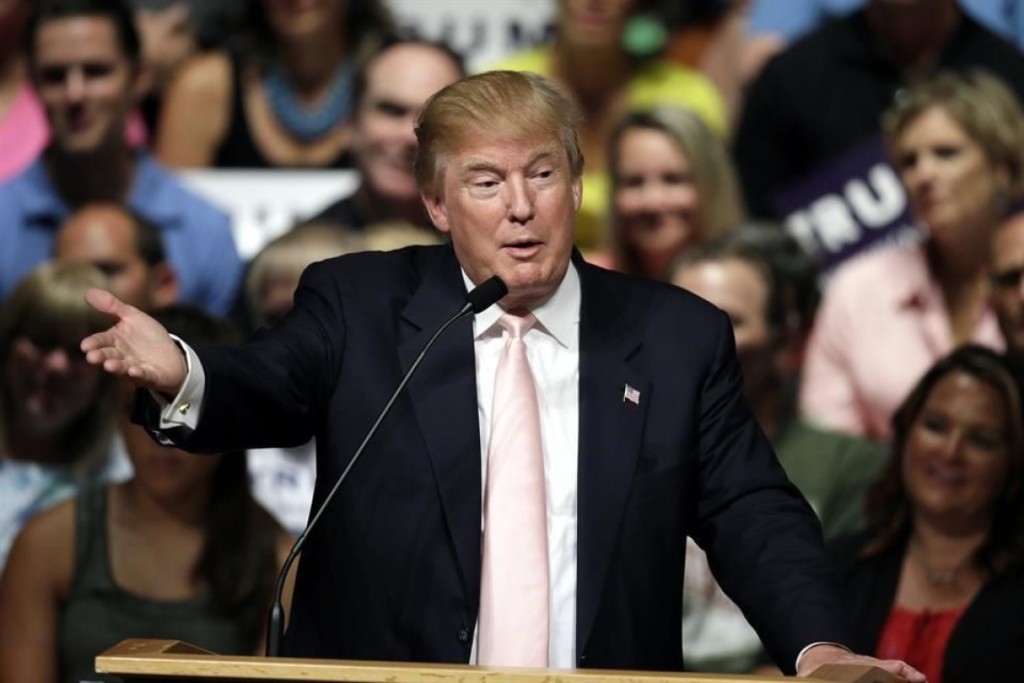
Whether you love him or hate him (I don’t think there’s an in-between), you have to admit Donald Trump has established his personal brand and fortune throughout the years by being extremely brash, creative, and smart: all with a very flippant attitude. Whether you like him or not, you have to admit that first in real estate, then reality TV, and now in politics, Trump has led the way in redefining the conventional and in turn achieving power, success, notoriety, power, and wealth. Now with Trump’s run for the White House, he is redefining American politics in terms of translating his brash, contentious style into what may be an unbeatable methodology of capturing the hearts and minds of disgruntled American voters. Trump has never been afraid to say what’s on the tip of his tongue. In the past, this propensity to attack, detract, and offend has lessened his intellectual credibility by defining his vision as Kardashian reality star style banter. But now his push-the-limit style converted into political rhetoric in a serious run for the White House, is playing well to many voters. He can berate Mexicans and Chinese, call John McCain a fake hero, be accused of raping his ex-wife and consorting with the mob, and even be described as uncharitable in his giving. Right now, he’s more than Ronald Reagan teflon, he’s kryptonite. Whether they are Republican, Democrat or a growing number of independent voters, American voters are tired most living paycheck to paycheck with no hope of digging out of debt. They are frustrated with a lackluster economy, ineffective governance in both Washington and state capitals, and continuous undeclared war. Most importantly, no matter where they stand in the political spectrum, the electorate is fed up with traditional mainstream politics, and even fringe Tea Party and leftist politics, too. In his ShockReality manner, Trump is spouting off truisms that Americans are feeling, but won’t enunciate on their own. If you believe the polls, Trump’s ShockReality messaging is playing well with the Republican base,. with him leaping ahead in a crowded pack of GOP hopefuls. No matter what he says, Americans now used to years of watching reality TV, want more from him, even demand more, with really no severe consequences to his popularity in a fast 24-7 news cycle that keeps moving on to the next sound bite. Some, though, say it’s one thing to practice ShockReality politics, it’s another to get down to the basics of backing up acerbic banter with hard policy. A major criticism, which shows signs of being out of touch with the true state of American politics, says he needs to come up with solutions and not just lash out about systemic problems in 2015 America. In recognizing his success so far in his messaging, David A. Fahrenthold in The Washington Post wrote: “But, so far, he’s missing something basic: a policy platform. A formal list of Trump’s ideas for America.” Here’s the game changer that Trump recognizes and no one else wants to admit: Americans don’t need or demand a policy platform for a presidential candidate to earn their vote. They just want some serious change, no matter how it comes. They want instead, a president, or any politician, who is sympathetic to their many frustrations and fearless enough to say what they feel, what they want, and want they need. It’s simple: They want a great America again. And Trump’s ShockReality political style works better than the Tea Party rhetoric precisely because it is not chained down in inflexible ideology. Instead, it stimulates a hope that President Obama correctly identified and ran on in 2008, but failed, like George W. Bush before him to deliver during his term in office. Donald Trump, and even now Joe Biden too with his own style of shooting off his mouth, is about to change American presidential politics for good. Calling Trump’s ShockReality messaging a phenomenon, and discounting his 2016 run, in our age of disdain is not only a mistake, but a lack of vision of the future of American politics. Steven Kurlander blogs at Kurly’s Kommentary (stevenkurlander.com) and writes for Context Florida and The Huffington Post and can be found on Twitter @Kurlykomments. He lives in Monticello, N.Y.
2016 Republicans use Donald Trump, TV to make debate cut

Rick Perry is attacking Donald Trump‘s credibility and branding the billionaire businessman “a cancer on conservatism.” Rick Santorum, a conservative stalwart, popped up on a TV program popular with liberals. Lindsey Graham set his cellphone on fire. With the first debate of the Republican presidential campaign approaching, the White House hopefuls are trying everything they can to improve their polling position. A candidate needs to place in the top 10 in an average of national polls to meet the criteria Fox News Channel has set to take the stage Aug. 6 in Cleveland. Those kept out risk being overlooked by voters and financial backers heading into the critical fall stretch before the nominating contests start early in 2016. “If you’re not on the stage you’re irrelevant, you don’t matter,” said Republican pollster Frank Luntz. “Unless you have some serious ad dollars, it’s not a glass ceiling. It’s a concrete ceiling.” At of this past week, former Hewlett Packard CEO Carly Fiorina, Louisiana Gov. Bobby Jindal, former New York Gov. George Pataki, ex-Pennsylvania Sen. Santorum and South Carolina Sen. Graham were outside the top 10. Others close to the edge including Ohio Gov. John Kasich, New Jersey Gov. Chris Christie and ex-Texas Gov. Perry. That would relegate them to a second-tier debate, only an hourlong airing before the prime-time event. “In your heart of hearts, you want to see me debate Hillary Clinton,” Fiorina, the only woman in the Republican contest, said with a grin, drawing applause from more than 100 people at an Ames country club Thursday. “I would of course love to be on the debate stage, but we’re going to keep going with or without it,” she told reporters afterward. “The boys are going to fight, and I’m going to keep doing what I’m doing.” One guaranteed participant is Trump, despite incendiary comments about Mexican immigrants and Arizona Sen. John McCain‘s war record. Trump’s remarks have drawn a backlash in a party trying to expand its Latino voting bloc and where national security is an influential constituency. Boring in on Trump is one approach some rivals hope will help them to break through as the debate nears. Perry unloaded on Wednesday when he called Trump’s campaign a “barking carnival act” and “toxic mix of demagoguery, mean-spiritedness and nonsense.” Perry pollster Greg Strimple said the goal of the speech was part of a long-standing effort to raise his profile, not to get him in the debate. “We had long-planned a speech defending conservatism,” Strimple said. “When Donald Trump made his negative comments, it provided us the perfect comparison.” Perry’s supporters are buying national cable ads that could boost his numbers ahead of the debate. On Friday, backers of Christie announced a new ad to air on Fox News. Graham, even further behind in polling, called Trump a “jackass” after the real estate executive said McCain was “not a war hero.” McCain served as a Navy pilot during the Vietnam War, who was captured after his plane was shot down and held for more than five years as a prisoner of war. Graham then starred in a video produced by a conservative website demonstrating how to destroy a cellphone after Trump publicly disclosed Graham’s number during a campaign appearance in South Carolina. Curt Anderson, a strategist advising Jindal’s campaign, wrote in Thursday’s Wall Street Journal that the Republican Party was sabotaging itself by controlling the debates too much, after concluding that marginal candidates dragged 2012 nominee Mitt Romney too far to the right. “They have come out to limit the number of debates we can have, they dictated who can have it, where you have it and who will moderate it,” Anderson said in an interview, adding that his complaints were unconnected to Jindal’s campaign. “The only thing left is to dictate what can be said in it.” As with Perry, an outside group supporting the Louisiana governor is buying ads on national cable just in time for the debate. Santorum spokesman Matt Benyon said Santorum’s TV appearances, including on MSNBC’s “The Rachel Maddow Show,” were timed to take advantage of the candidate’s time in New York this past week, not to boost his poll numbers. “Would it be great to be in the debate? Absolutely,” Benyon said. “But to change your campaign strategy to focus on one date in August is a pretty shortsighted idea.” Republican consultant Reed Galen said candidates may have a better chance to introduce themselves to voters in the less-crowded second-tier debate than competing with Trump and the other contenders in the main debate. Still, he understood the drive for prime time. “You get more licks in AAA-ball,” Galen said. “But the majors are the big show.” Republished with permission of the Associated Press.
New WaPo-ABC News poll shows persistent resistance from conservatives for Jeb Bush
Although the big headlines coming out of the Washington Post/ABC News poll released Monday afternoon were all about Donald Trump leading the rest of the GOP presidential field by double digits, it also indicates that Jeb Bush‘ month-long momentum may be ebbing slightly. Trump leads the field with 24 points in the national survey, Scott Walker is second with 13 percent, and Bush is third at 12 percent. Mike Huckabee is fourth in the race with 8 percent, Marco Rubio is fifth at 7 percent, Ben Carson and Rand Paul are at 6 percent, Ted Cruz and Rick Perry are at 3 percent, and John Kasich and Bobby Jindal are at 1 percent. An important caveat on the Trump rating. The poll was taken for four days last week: Thursday through Sunday. On Sunday, the day after Trump’s comment on John McCain not being a war hero went viral to a slew of negative commentary, his numbers slumped to single-digits. The poll also brings down Bush a notch. The former Florida governor has been polling strong the past month, in the weeks since his June 15 presidential candidacy announcement. In most national surveys for the past couple of weeks, he has been 1-2 with Trump. His drop to third place in this survey may indicate less a reduction in popularity for Bush than with the explanation that Walker is enjoying a bump after his official entrance into the race last week, with the poll taken just days later. Looking deeper into the poll, however, conveys some concern for Team Bush. He is still viewed skeptically by some Republicans. Twenty-two percent of Republicans say Bush’s views on most issues are too liberal for them. In comparison, only 17 percent of Republicans say Trump’s views are too liberal for them. And while a majority (62 percent) of Republicans polled say they definitely would not vote for Trump in the general election, an alarming 44 percent say they would not vote for Bush in the general election. The poll was taken before Bush’s Tallahassee speech Monday that had to warm the hearts of conservatives everywhere. Among the bullet points was a recommendation for swift and permanent cuts to federal agencies, specifically endorsing a “three out, one in” policy of replacing only every third federal employee who exits the government with the exception of “vital” areas such as national security. The Post-ABC News poll was conducted July 16-19 among a random national sample of 1,002 adults, including landline and cellphone respondents. Overall results have a margin of sampling error of plus or minus 3.5 percentage points.
No retreat, no surrender for free-speaking candidate Donald Trump
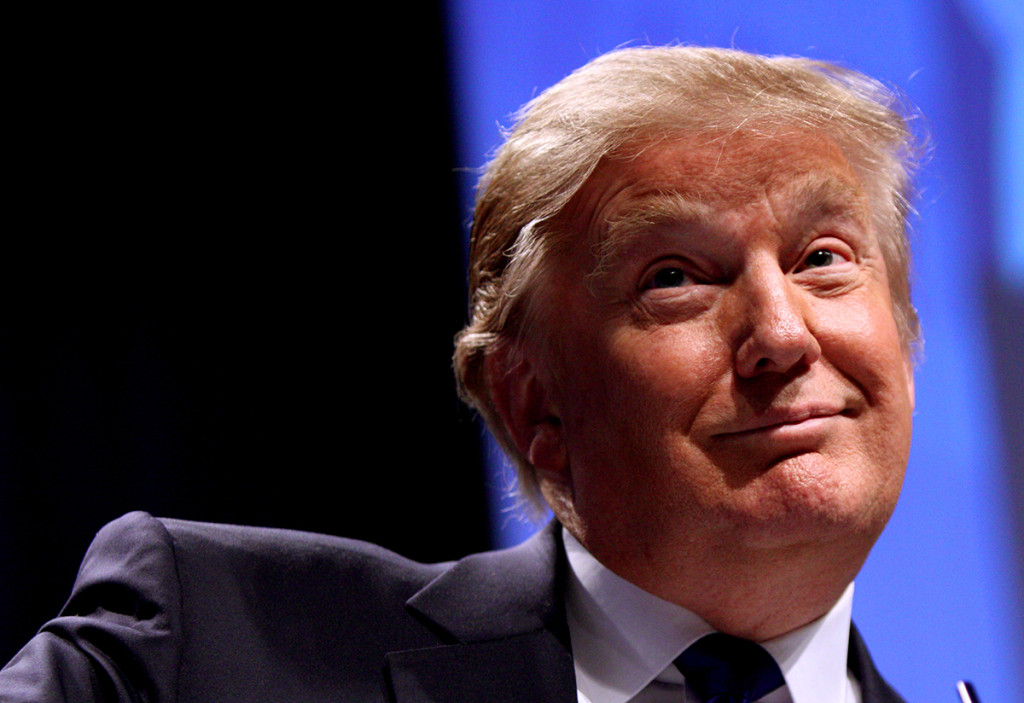
Once again, Donald Trump isn’t backing down from comments that have inflamed the Republican presidential race. And some of his rivals are no longer treating him with kid gloves. Republican presidential contenders Marco Rubio and Rick Perry said Trump, with his latest bombast, has demonstrated he is not fit to be president. At an Iowa candidate forum on Saturday, Trump dismissed Republican Sen. John McCain‘s reputation as a war hero, saying the aviator was merely taken captive after being shot down in Vietnam and “I like people who weren’t captured.” “I will say what I want to say,” Trump said Sunday, claimed a strong record of supporting veterans and accused McCain of failing them in Washington. “I will do far more for veterans than John McCain has done for many, many years, with all talk no action,” Trump said on ABC’s “This Week.” ”He’s on television all the time, talking, talking. Nothing gets done.” A McCain spokesman has said the Arizona lawmaker would have no comment about Trump’s remarks. Although unrepentant, Trump allowed after the Iowa event that McCain might be a hero after all, but said people who “fought hard and weren’t captured and went through a lot, they get no credit.” And he said Sunday about the Republican race: “I’m certainly not pulling out.” McCain spent more than five years as a prisoner of war, enduring torture. He stirred Trump’s anger last week when he said Trump’s comments about immigrants had “fired up the crazies” at a Phoenix rally. Weeks ago, after Trump asserted that Mexican immigrants are rapists and drug dealers, Hispanic leaders were incensed not only about those remarks but about the slow and halting response from others seeking the GOP nomination. But the fallout from Trump’s latest salvo has spread quickly and indicates that at least some of his competitors are losing their inhibitions about repudiating him. Rubio, a Florida senator, said on CNN’s “State of the Union” that Trump insulted all prisoners of war, not just McCain, the 2008 GOP nominee defeated by Barack Obama. “He’s saying that somehow if you’re captured in battle you’re less worthy of honors,” Rubio said. “It’s not just absurd, it’s offensive. It’s ridiculous. And I do think it’s a disqualifier as commander in chief.” Rubio said as the campaign goes on and Trump commands attention, “it’s required people to be more forceful in some of these offensive things that he is saying.” Perry, one of the few veterans running for president, said Trump has demonstrated he has neither the character nor the temperament for the White House. “Over the top,” the former Texas governor said of Trump on NBC’s “Meet the Press.” ”Really offensive.” Jeb Bush, whose wife is from Mexico, took sharp offense at Trump’s earlier comments as others hedged. After Trump’s comments about McCain, the former Florida governor tweeted, “Enough with the slanderous attacks.” But both Texas Sen. Ted Cruz and former Arkansas Gov. Mike Huckabee, while agreeing McCain is a genuine hero, sidestepped when asked if they condemned Trump’s remarks. Republished with permission of the Associated Press.
Trump’s comments on POW’s disgusting but not surprising
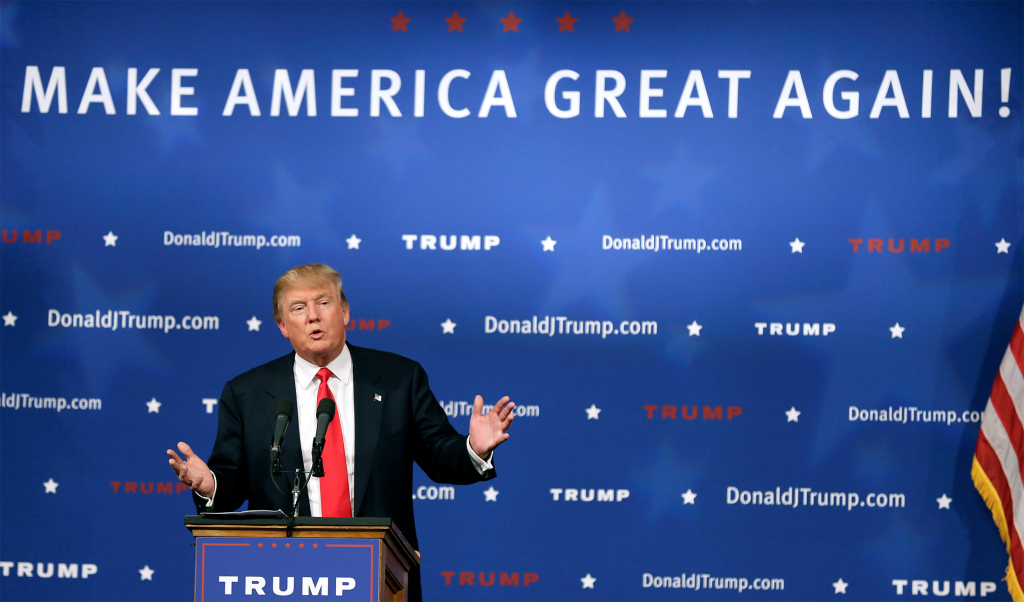
If you’ve been watching the train wreck that is Donald Trump‘s supposed presidential campaign it should come as no surprise that he said something terribly offensive today. Looking at the reactions it looks as though people weren’t expecting him to do something so confounding to which I have to ask “have you not been paying attention?” Trump isn’t taking this race seriously and he’s not behaving and speaking like a man fit or desiring to run for president of the United States. In case you missed it, at an event Saturday afternoon, he mocked John McCain‘s status as a prisoner of war, saying “He’s a war hero because he was captured. I like people who weren’t captured.” Now I get that his comments were particularly inflammatory because the military is involved and we are a nation that by-in-large respects our military regardless of political party or ideology but I’m watching the coverage of this latest disaster and the press and others are reacting as if this is the end of his campaign. Let’s be clear, Trumps campaign will end when Trump is ready for it to. As long as his poll numbers are high and as long as he’s getting media coverage he’s going to continue. He’s currently topping polls not because anyone is actually going to vote for him for president but because of the many candidates he’s the one with the highest name ID and because of people are just fed up with the state of American politics today. I believe even the most low information voters wouldn’t vote to put a man as unpredictable as Trump in charge of our national security and economy. Trump will inevitably try to fix his mess and will continue to make a mockery of what should be a serious race where serious issues are discussed. The crisis we find ourselves in as a nation both economically and with the current threats to national security both here at home and abroad will ultimately be what voters are looking to answer with the next president and Trump, well he’s not disciplined enough to address those issues with the seriousness they deserve. Full video of Trump remarks below. McCain comments start at 5:40
GOP candidate Donald Trump goes after John McCain’s war record

Republican presidential candidate Donald Trump criticized Arizona Sen. John McCain‘s military record Saturday, saying he was a “war hero because he was captured.” Speaking at a conference of religious conservatives in Iowa, Trump was pressed on his recent description of the 2008 Republican presidential nominee as “a dummy.” McCain served as a Navy pilot during the Vietnam War. He was captured after his plane was shot down and was held more than five years as a prisoner of war. The moderator, Republican pollster Frank Luntz, described McCain as “a war hero.” Trump said McCain “is a war hero because he was captured. I like people who weren’t captured.” The comment drew some boos from the audience. During a news conference after his appearance, Trump did not apologize but sought to clarify his remarks. “If a person is captured, they’re a hero as far as I’m concerned. … But you have to do other things also,” Trump said. “I don’t like the job John McCain is doing in the Senate because he is not taking care of our veterans.” A spokesman for McCain, Brian Rogers, said no comment when asked about Trumps remarks. Trump said he avoided service in the Vietnam War through student and medical deferments, adding that he did not serve because he “was not a big fan of the Vietnam war. I wasn’t a protester, but the Vietnam war was a disaster for our country.” The comments about McCain drew rapid criticism from other 2016 hopefuls. In a statement, former Texas Gov. Rick Perry said the remarks make Trump “unfit to be commander-in-chief.” Former Florida Gov. Jeb Bush tweeted: “Enough with the slanderous attacks. @SenJohnMcCain and all our veterans – particularly POWs have earned our respect and admiration.” Louisiana Gov. Bobby Jindal, South Carolina Sen. Lindsey Graham and Wisconsin Gov. Scott Walker were also quick to condemn the remarks. Texas Sen. Ted Cruz called McCain an American war hero, but sidestepped when asked whether he would condemn the remarks. “I recognize that folks in the press love to see Republican on Republican violence,” Cruz said. “You want me to say something bad about Donald Trump or bad about John McCain or bad about anyone else and I’m not going to do it.” Trump was among 10 GOP presidential candidates on Saturday’s program for the Family Leader Summit. Republished with permission of The Associated Press.
2016 prospect Rand Paul in new book: GOP willing to change
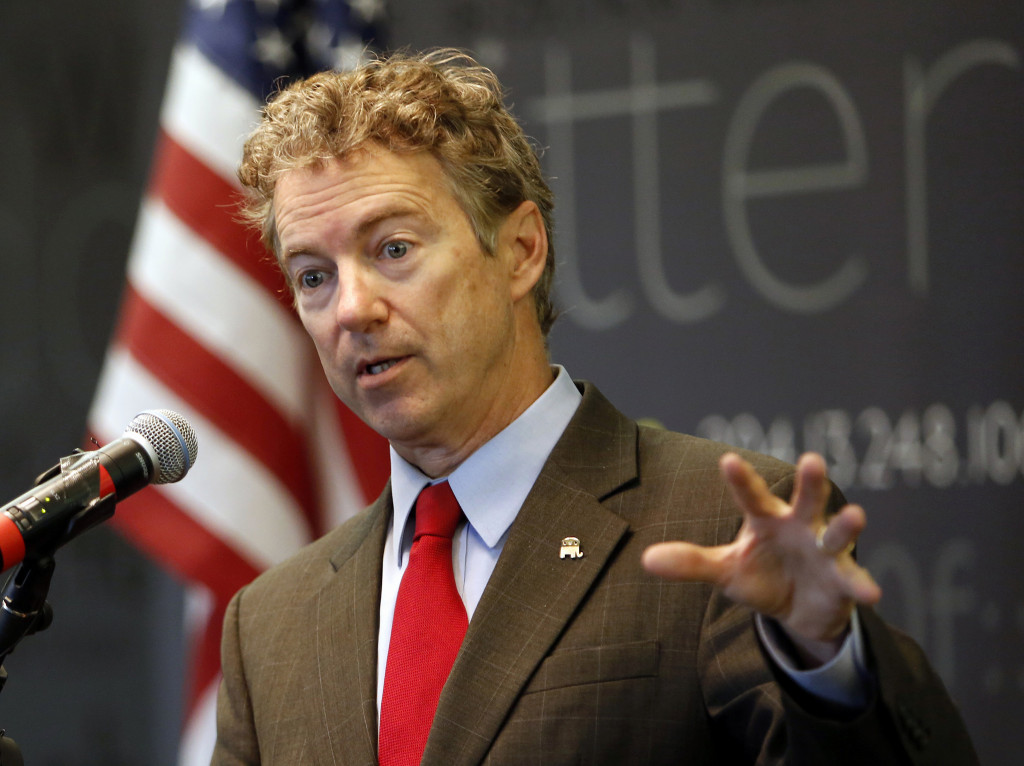
Republican presidential candidate Rand Paul reaches out in his most direct way yet to African-Americans in a new book that highlights his libertarian policies on government surveillance, the economy and criminal justice reform. “My party has let the bond it once enjoyed with minorities fray to the point that it is near beyond repair,” the Kentucky senator writes in “Taking a Stand: Moving Beyond Partisan Politics to Unite America,” set to be released later this month. He continued, “My Republican Party, the Republican Party I hope to lead to the White House, is willing to change.” Paul, 52, has made reaching out to African-Americans a centerpiece of his political brand as he embarks on his 2016 campaign for president. More than a decade has passed since the Republican Party last won a presidential contest, due in part to the GOP’s struggle with minority voters, a growing segment of the population that has overwhelmingly favored Democrats in recent years. President Barack Obama won 93 percent of the black vote in 2012, continuing his party’s overwhelming advantage with black voters that began when Republican presidential nominee Barry Goldwater opposed the Civil Rights Act of 1964. The trend is similar among Hispanic voters, who have preferred Democrats by at least 18 points in every presidential contest since at least 1980. “I don’t think we’ve done enough of taking our message to people, and I don’t think we’ve brought our message in an appropriate way,” Paul said Thursday of the GOP’s minority outreach during an interview with The Associated Press. “I think also there’s a uniqueness to my message within the Republican Party that allows me to go places that nobody else is either willing to go or able to go.” The new book, a copy of which was obtained by The Associated Press, comes as Paul plays a starring role in the debate over government surveillance. He spent hours on the Senate floor Wednesday protesting the planned extension of the Patriot Act, which includes a provision allowing the National Security Agency to collect bulk records of phone calls made by Americans. Many Republicans support the surveillance program, including Arizona Sen. John McCain, whose description of Paul as a “wacko bird” is featured prominently on the book’s back cover. In the book, Paul writes that such surveillance programs allowed the government to spy on prominent civil rights leaders in the past, most notably Martin Luther King Jr. He said he raised such concerns during a private meeting last February with then-Attorney General Eric Holder, the first African-American to hold that office. “Surveillance was used to try to cripple the civil rights movement. You would think this president above all others would be mindful of the potential for abuse in allowing so much power to gravitate to the NSA,” he wrote, referring to President Barack Obama, the nation’s first black president. “Holder nodded his understanding but was noncommittal.” He said he later challenged Holder more directly. “How could our first African American president condone pervasive spying on Americans?” Paul asked, to which he said Holder responded, “Let’s just say the administration’s position on the NSA is not monolithic.” “He left it at that, which only left me with more questions,” Paul wrote. “Did the attorney general mean he was against the spying? If so, why was his voice falling on deaf ears?” Holder, who recently left his position as the nation’s top law enforcement officer, did not respond to a request for comment about Paul’s description of the meeting. Paul also criticizes former President George W. Bush for adopting the Patriot Act following the 9/11 terrorist attacks, charging that “because of President Bush’s overreach, the Bill of Rights protection of our privacy began to fall apart.” He adds that Obama has further shredded such protections. “Power needs to be reined in, because we never know when a leader will arise who will use the power to target Jews or blacks or evangelical Christians or the tea party or any other minority,” he wrote. Paul won praise from black leaders as one of the only members of Congress to visit Ferguson, Missouri, after police shot to death an unarmed black man last year. But he was widely criticized for his comments after racial violence erupted more recently in Baltimore, when he said in a television interview he was “glad the train didn’t stop” as he passed through the city. Paul writes at length about his support for criminal justice reform, which includes ending mandatory minimum sentences for nonviolent offenders and restoring voting rights to nonviolent felons. He also opposes the use of military weapons by local police departments and supports the creation of economic freedom zones with low tax rates in depressed urban areas. “Although I was born into the America that experiences and believes in opportunity, my trips to Ferguson and Detroit and Atlanta and Chicago have revealed to me an undercurrent of unease,” he wrote. “I want to be part of a united America in which every child, rich or poor, black or white, truly believes that they have a chance at the American Dream.” Republished with permission of The Associated Press.


